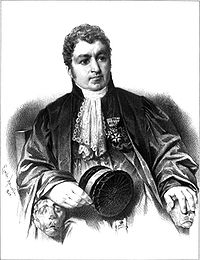
Alexandre Du Sommerard
Encyclopedia

Life
He volunteered for the army at 14 and took part in the French Revolutionary WarsFrench Revolutionary Wars
The French Revolutionary Wars were a series of major conflicts, from 1792 until 1802, fought between the French Revolutionary government and several European states...
. Returning to civil life, he became attached to the Cour des comptes, at first as a référendaire, then as a conseiller-maître, spending all his leisure time and most of his modest fortune on collecting, classifying and publishing a collection of medieval and Renaissance art objects.
Each day, his cabinet
Cabinet of curiosities
A cabinet of curiosities was an encyclopedic collection in Renaissance Europe of types of objects whose categorical boundaries were yet to be defined. They were also known by various names such as Cabinet of Wonder, and in German Kunstkammer or Wunderkammer...
of furniture, vases and utensils of all kinds which he saved from their destroyers, since for a long while he was almost the only person in Paris collecting these curiosities that were later so much studied. Little by little he gained imitators and, always ready to reply to questions of taste and even enquiries from the indiscrete curious, Du Sommerard welcomed people to see his collection and gave lessons in practical archaeology.
The hôtel de Cluny, a Gothic palace built in the late 15th century by Jacques d'Amboise and the only surviving medieval palace in Paris, owes its survival to Du Sommerard. He took it over as a home and as a place to house his collection. On his death the Musée d’antiquités nationales that he created was acquired by the French state and rue des Mathurins was renamed rue du Sommerard
Rue du Sommerard
The rue des Mathurins, now known as the rue du Sommerard after Alexandre Du Sommerard, is a street in the 5th arrondissement of Paris, in the Sorbonne quarter....
in his honour.
Works
- Notices sur l’hôtel de Cluny et le palais des Thermes, 1834 ;
- les Arts au Moyen Âge (in-fol. et 5 volumes de texte, 510 pages, 1842–1846), a large work on medieval art, the summation of his travels, long studies and wide reading, which he worked on until his death.
Source
- Prosper MériméeProsper MériméeProsper Mérimée was a French dramatist, historian, archaeologist, and short story writer. He is perhaps best known for his novella Carmen, which became the basis of Bizet's opera Carmen.-Life:...
, Notice sur la vie et les travaux d’Alexandre Du Sommerard, Fondateur des collections de l’Hôtel de Cluny, Paris, Hôtel de Cluny, 1883.

